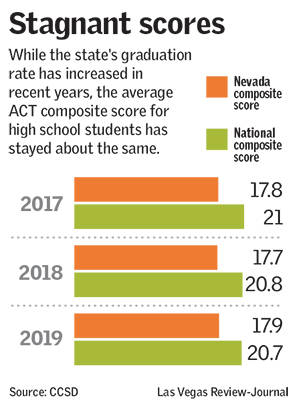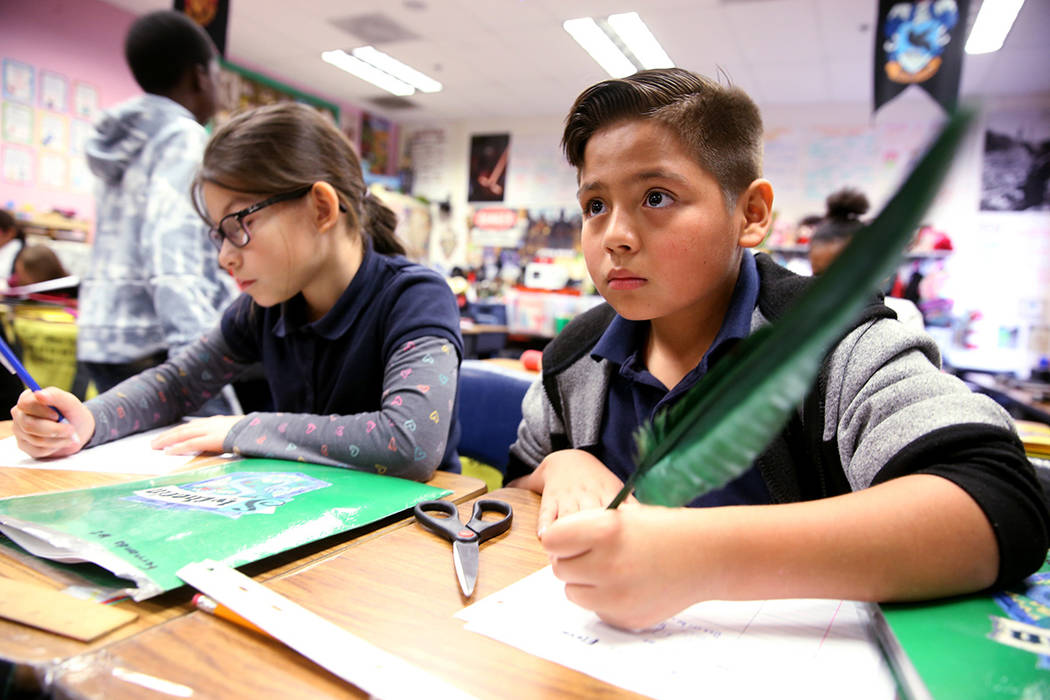Nevada stuck in slow lane in improving academic proficiency
When it comes to improving academic proficiency, Nevada remains stuck in the slow lane.
The state again lagged below the national average in the 2019 National Assessment of Educational Progress (NAEP), known as the “Nation’s Report Card,” in reading and math among elementary and middle-school students. The news was slightly better for the Clark County School District, which was mostly rated on par with other large, urban school districts.
But the report released late Tuesday showed the state’s scores remained largely stagnant since the last assessment in 2017.
Jhone Ebert, the state superintendent of public instruction, focused in a statement on two areas where Nevada did see improvement: in fourth-grade math scores and those of fourth-grade English language learners.
“I am encouraged by the growth demonstrated by our fourth grade students in mathematics and for some student groups, including students who are English learners,” Ebert said. “We will strive to continue this trajectory and see all students rise above basic proficiency.”
Meanwhile, the state’s latest results for the ACT college entrance exam, released early Wednesday, showed some change among high school students. The average composite score inched up from 17.7 to 17.9, an improvement also seen in three of the four sections of the exam. The exception was science, which remained at a score of 17.9.
It was the fourth straight year in which Nevada had the lowest average composite score in the nation.
“While we saw some improvement this year, I have heard from school leaders that they would like additional supports for their teachers, students, and families,” Ebert said in the statement. “The Nevada Department of Education is working closely with the ACT administrators, and school districts to ensure targeted resources are made available to support and improve student results.”
Comparing the states
The NAEP tested roughly 600,000 students nationwide to measure reading and math skills in fourth- and eighth-grade students — providing a measure that allows for academic proficiency comparisons between states.
Nevada remained near the bottom of the pack, with no significant changes in any of the grades or subjects except for a significant increase in fourth-grade math scores.
The state’s achievement showed 26 percent of students reaching proficiency in eighth-grade math, with 34 percent reaching that level in fourth-grade math, compared with national averages of 33 percent and 40 percent, respectively.
Unlike many state education assessments, NAEP proficiency indicates a student’s mastery of the subject matter rather than assessing whether a student is achieving on grade level, explained Peggy Carr of the National Center for Educational Statistics.
The story was slightly more positive for the Clark County School District, which remained close to the proficiency averages for 27 large urban districts across the country. The one exception: Clark County students fell significantly below the big-district average in eighth-grade math.

And Clark County outperformed other big urban districts, including Los Angeles, Philadelphia, Baltimore, Cleveland, Milwaukee and Detroit, among others, across all grades and subjects.
However, the district showed no significant change in the average score across all grade levels and subjects compared to the last assessment in 2017 — with the exception of a four-point increase in the fourth-grade math score.
The district did register significant gains in average score for certain subgroups, including an increase in reading and math scores for fourth-grade Hispanic students, fourth-grade English language learners and fourth-grade students who were eligible for free or reduced-price lunch.
ACT scores remain low
Although the state has celebrated the increase in ACT scores among public high-school students, the average composite score for all students in the state who took or re-took the test as part of the graduating class of 2019 remained the lowest in the nation.
Not all states require public-school students to take the ACT as part of a graduation requirement as Nevada does, which skews comparative results. But Nevada still performed the lowest of the 14 states that require all students to take the ACT.
Contact Amelia Pak-Harvey at apak-harvey@reviewjournal.com or 702-383-4630. Follow @AmeliaPakHarvey on Twitter.


















